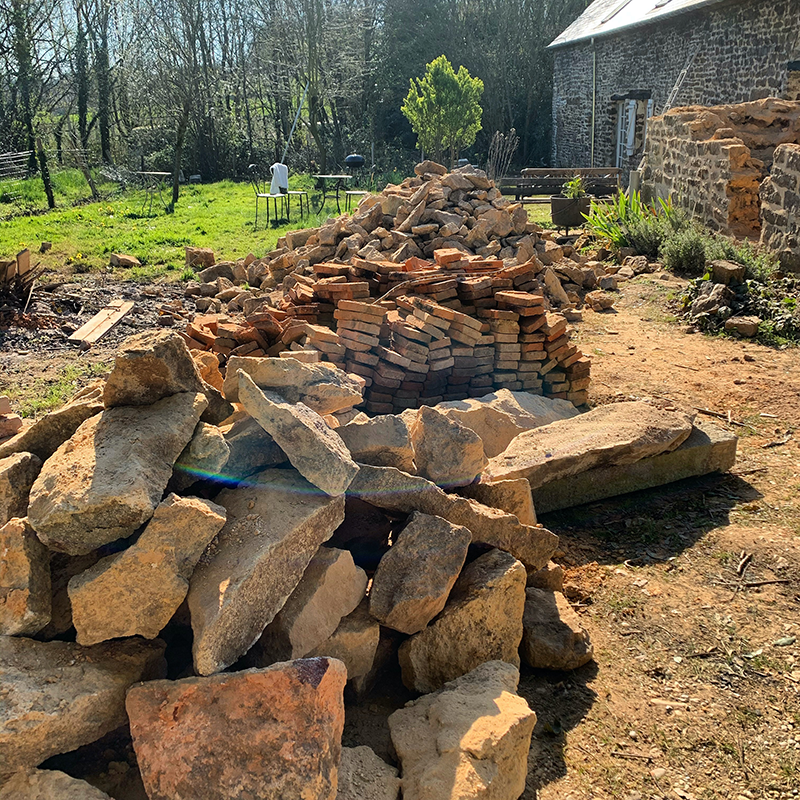The sunlight, captured, and reflected back into the north-facing room where I sit, hints at what’s to come over the next few days—temperatures in the mid-teens to somewhere around 20. Blue skies as well, or so the sky oracles promise, which is sort of too bad. We could use some rain, but maybe perfect Spring weather we need even more, both body and soul.
Last week, the final stones—or perhaps, the nearly final stones—came out of what had once been an enormous bread oven. It had been built some many decades ago to support the farm and the surrounding village. It would have taken a small copse of trees to fuel it every week, and more flour, yeast, and salt than I can comfortably imagine. In any case, for the two of us, it wasn’t useful for anything other than a well-built curiosity, and we had some time on our hands (and a never-ending collection of ‘ideas’, born—like Athena—straight from our foreheads (in our case, after a whiskey)). A well-faced outer wall gave way, as many do in these parts, to a rubble center, and then to the infrastructure of the oven itself, which included a couple of hundred bricks, and a couple tons of dirt. Taking it down was messy.

A bonus—half-a-dozen or so granite slabs, ranging between 600 to 200 pounds—that have in some cases already found a new life as stairs in Madame’s garden. This work, unexpected to be sure, is an extraordinary thing to watch, and even more breathtaking as pieces come together: a stair here, a stacked stone wall there, a planting, or a new collection of vistas opening up from windows inside and likely places of respite outside. The largest stair—the one built from the 600-pound slab—took a day. Madame dug, and leveled, and smoothed, and dug, and re-leveled in the morning, and then in the afternoon, we moved the stone. Slowly. Archimedes might have been on to something, but so too were the slave drivers of the pharaonic Nile.
The virus and its undoing of the postmodern world is, of course, a constant presence here. Our English neighbors are as horrified by what’s (not) been done in their country as we are about what’s (not) been done in ours. It makes for depressing across-the-lane discussions. Although as our neighbor C pointed out, at least no one is talking about Brexit anymore. Or anything else, really, come to think about it. Incompetency still, regardless, an unavoidable thread.
Some joking references earlier in the week to another neighbor about how we might have to relearn the lessons of the Victory Gardens that where such a part of the homefront during the second war and which enabled a certain sort of self-sufficiency in the face of shortages and despair. Then, this morning, at the market, a group of ladies in their seventies and eighties, standing in front of the colorful vegetable seed packets. They know, I worry, what they’re doing.

Charlemagne the cat is managing his transition from world-weary traveler and blasé commentator on all things dynamic, to a maddened, ferocious connoisseur of tall grass, winged seductions, hilltop views of cattle, rustles of an unknown sort in the midst of the woodpile, and a hundred other new experiences that he’s taken to so much better than we imagined. His response to his first cat door was initially tentative, and then nonchalant, and then one of incomprehension when he found it locked. Now, he’s much better. This evening, a cocktail gathering in only the loosest definition. Four people from the same village in a vague circle, on private property—three meters apart, each with their own prepared drink. The new normal. What after all does hospitality mean, when the most hospitable thing you can do is stay away from people?


Be the first to reply